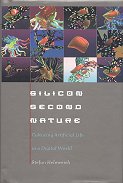In the early 1990s, Helmreich conducted an "anthropological study" of the Artificial Life researchers at the Santa Fe institute, and chronicles his results herein.
I had a lot of problems with this book. So many so that I started also carrying a pad of paper with me on the train (where I was reading it during a daily commute) so that I could scribble down all the points I wanted to argue with.
As I understand it, Helmreich contends that everything the ALife researchers do is polluted by their own implicit racial, cultural and gender biases, because they are all white Western middle-class heterosexual males (except for the few who aren't). Well, yes, to some degree, certainly. We are all creatures of our environment and upbringing. And this is not exactly a criticism that hasn't been levelled at scientists, and science, before. Yet, as a scientist myself (albeit not a male one), I simply don't recognise the people Helmreich is describing. The inferred mind-set seems very off-kilter, as if viewed through a set of distorting mirrors that filters out all the scientific curiosity and questioning, and grotesquely magnifies the biases. (But then, I would say that, wouldn't I?)
And how much should we believe these are real biases, anyway, when they are contradictory? For example, consider the critique of ALife models of reproduction. First Helmreich describes the "heterosexual" bias of genetic algorithms thus:
...
There are a number of ways we might understand the exchange of bits between strings, but the metaphor of productive heterosex is gleefully emphasized by most authors.
But later he talks of Holland's Echo system:
So, if a model of reproduction is the culturally "familiar" one, its author is criticised for letting their heterosexual biases blind them to asexual alternatives. And if a model is "divested of sex", its author is criticised for letting their masculine biases blind them to heterosexual alternatives! Damned if you do, damned if you don't.
Another example that struck me as off-key was Helmreich's discussion of the use of the word "seed", in computational contexts such as random number seed and seeding an initial population. He claims this is deeply masculine imagery, because "seed" = "sperm", and all our imagery of "planting active seeds" in "passive, nurturing soil" is masculine Judeo-Christian imagery. Well, I'm sorry, but the imagery that raises for me is so old-fashioned as to border on the risible. (The bit about "Onan spilling his seed on the ground" has always given me a mental image of a sower dropping a bag of grain more than anything else.) Tom Ray picks up on this point, too, in his summary of Helmreich's position (based on reading an earlier draft), which expresses well much of what I'm trying to say:
In the very passage where Helmreich is discussing the imagery of the term "seed", he says
I draw attention to the use of the word "plants" in this extract. Is Helmreich guilty of using masculine Judeo-Christian imagery to thrust his potent ideas into our receptive open minds? Or is he merely using a common vegetative metaphor deeply rooted in our organic language?
Or maybe he is merely punning? I think not, for there is very little that is punning or playful about the style of the rest of the book. (Not necessarily a criticism, merely an observation.) But could that explain why he doesn't seem to "get" scientists' language? Scientists are always using terminology and metaphors from everyday use, usually playfully (strange, coloured quarks, anyone?). Earlier, there was the extract "the metaphor ... is gleefully emphasized", with a negative connotation. I would say rather "playfully emphasised". Just because scientists use familiar terminology in new situations, even deliberately metaphorically, doesn't mean they use these terms literally in their original senses. I admit that the choice of metaphor is influenced by culture (it could hardly be otherwise), and even admit that the original sense colours the eventual meaning, but not to the extent that Helmreich seems to be suggesting.
As another example of what looks like a misunderstanding of the very playfulness of scientists' terminology, on p186 we are shown, amidst a diversion into Westernised Zen and other religions, "evidence" of the fact that science fills a religion-shaped hole in the soul: Chris Langton is routinely referred to as the ALife "guru". Well, I'm sorry again, but guru is a common term in computing circles -- if it ever had any religious overtones, nowadays those have been lost. The word means, to most of us who use it, an expert, especially one who helps others, rather than keeping their arcane knowledge to themselves. Indeed:
The New Hacker's Dictionary, 1991]
One is rather left wondering why the use of "guru" is picked up on as indicating religious connections, but the equally common use of "wizard" is ignored? Why is there no suggestion that science stands in for our need for magic? Is it because that would just be silly?
I'm not hostile to all the ideas in here. But this kind of picking through the facts to support a position seems to me like reaching. I would instead have preferred a book that analysed how the researchers' racial, cultural and gender biases might be reflected in their work, how it affects what they study, the modelling assumptions they make, and their interpretation of the results. I would instead have liked to see how ALife research might be broadened, enriched and generalised by the inclusion of different biases. But then I would, wouldn't I?
